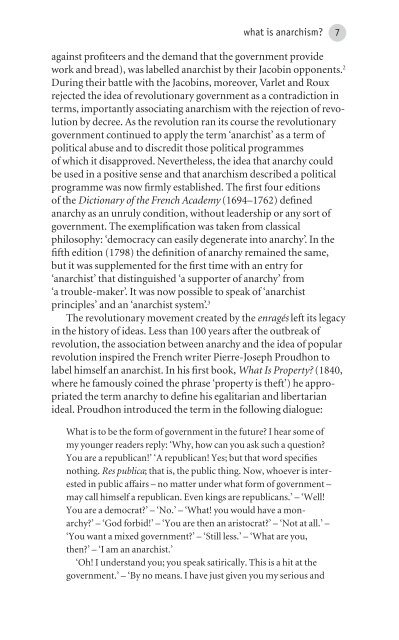o_195qg5dto17o4rbc85q1ge61i84a.pdf
You also want an ePaper? Increase the reach of your titles
YUMPU automatically turns print PDFs into web optimized ePapers that Google loves.
what is anarchism? 7<br />
against profiteers and the demand that the government provide<br />
work and bread), was labelled anarchist by their Jacobin opponents. 2<br />
During their battle with the Jacobins, moreover, Varlet and Roux<br />
rejected the idea of revolutionary government as a contradiction in<br />
terms, importantly associating anarchism with the rejection of revolution<br />
by decree. As the revolution ran its course the revolutionary<br />
government continued to apply the term ‘anarchist’ as a term of<br />
political abuse and to discredit those political programmes<br />
of which it disapproved. Nevertheless, the idea that anarchy could<br />
be used in a positive sense and that anarchism described a political<br />
programme was now firmly established. The first four editions<br />
of the Dictionary of the French Academy (1694–1762) defined<br />
anarchy as an unruly condition, without leadership or any sort of<br />
government. The exemplification was taken from classical<br />
philosophy: ‘democracy can easily degenerate into anarchy’. In the<br />
fifth edition (1798) the definition of anarchy remained the same,<br />
but it was supplemented for the first time with an entry for<br />
‘anarchist’ that distinguished ‘a supporter of anarchy’ from<br />
‘a trouble-maker’. It was now possible to speak of ‘anarchist<br />
principles’ and an ‘anarchist system’. 3<br />
The revolutionary movement created by the enragés left its legacy<br />
in the history of ideas. Less than 100 years after the outbreak of<br />
revolution, the association between anarchy and the idea of popular<br />
revolution inspired the French writer Pierre-Joseph Proudhon to<br />
label himself an anarchist. In his first book, What Is Property? (1840,<br />
where he famously coined the phrase ‘property is theft’) he appropriated<br />
the term anarchy to define his egalitarian and libertarian<br />
ideal. Proudhon introduced the term in the following dialogue:<br />
What is to be the form of government in the future? I hear some of<br />
my younger readers reply: ‘Why, how can you ask such a question?<br />
You are a republican!’ ‘A republican! Yes; but that word specifies<br />
nothing. Res publica; that is, the public thing. Now, whoever is interested<br />
in public affairs – no matter under what form of government –<br />
may call himself a republican. Even kings are republicans.’ – ‘Well!<br />
You are a democrat?’ – ‘No.’ – ‘What! you would have a monarchy?’<br />
– ‘God forbid!’ – ‘You are then an aristocrat?’ – ‘Not at all.’ –<br />
‘You want a mixed government?’ – ‘Still less.’ – ‘What are you,<br />
then?’ – ‘I am an anarchist.’<br />
‘Oh! I understand you; you speak satirically. This is a hit at the<br />
government.’ – ‘By no means. I have just given you my serious and




